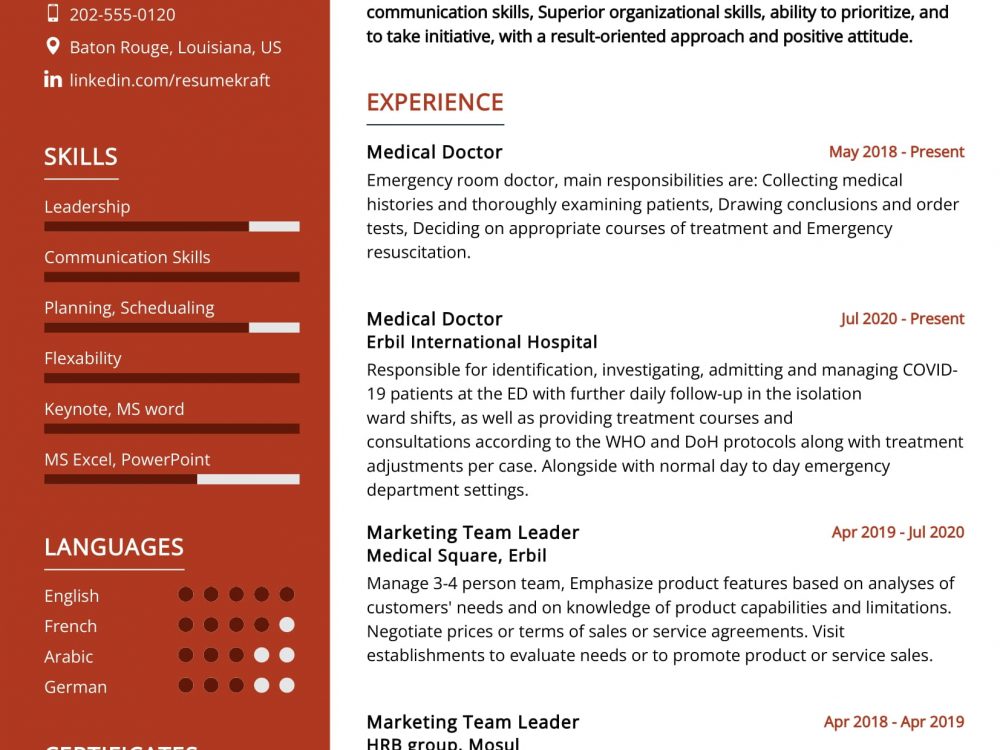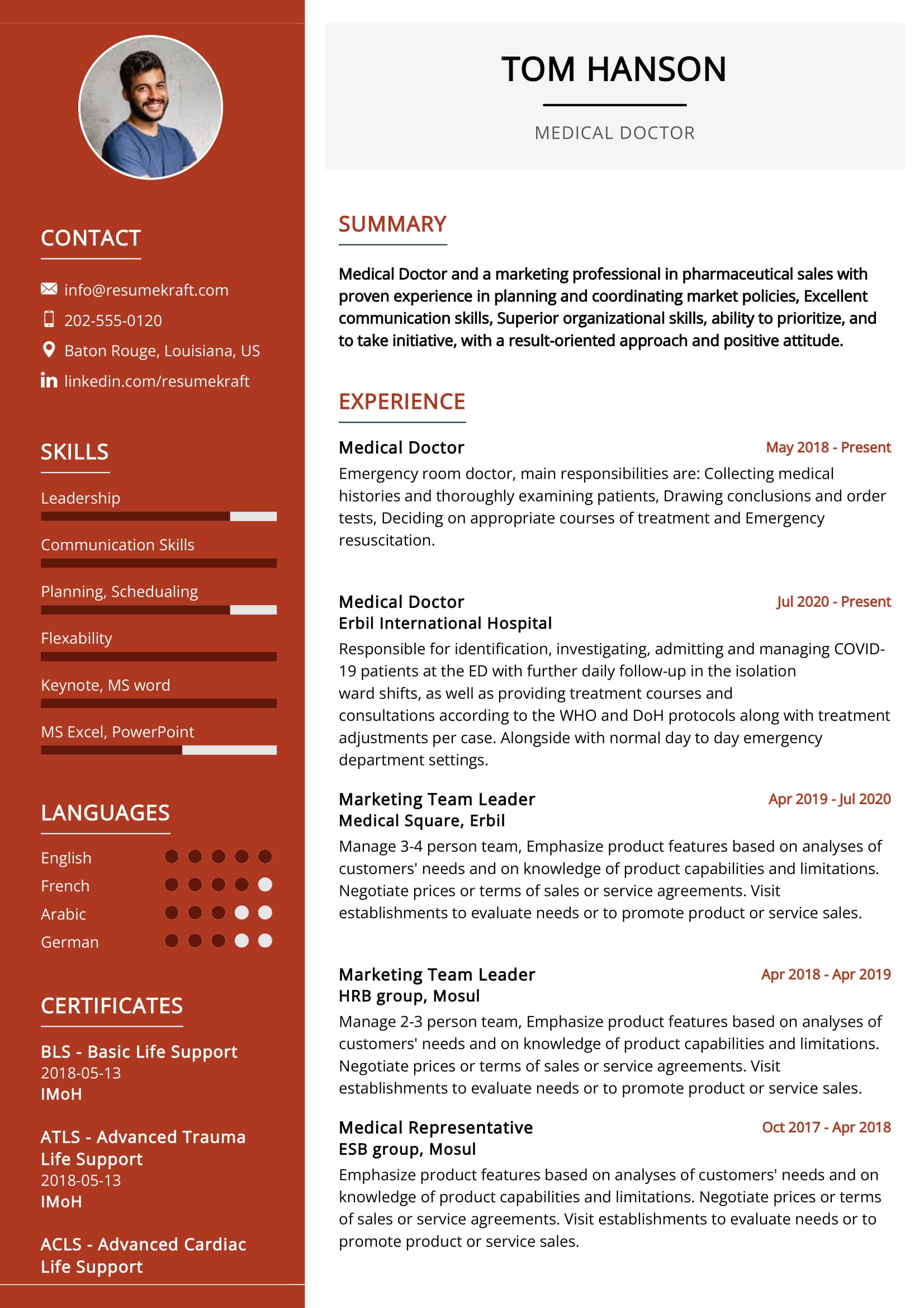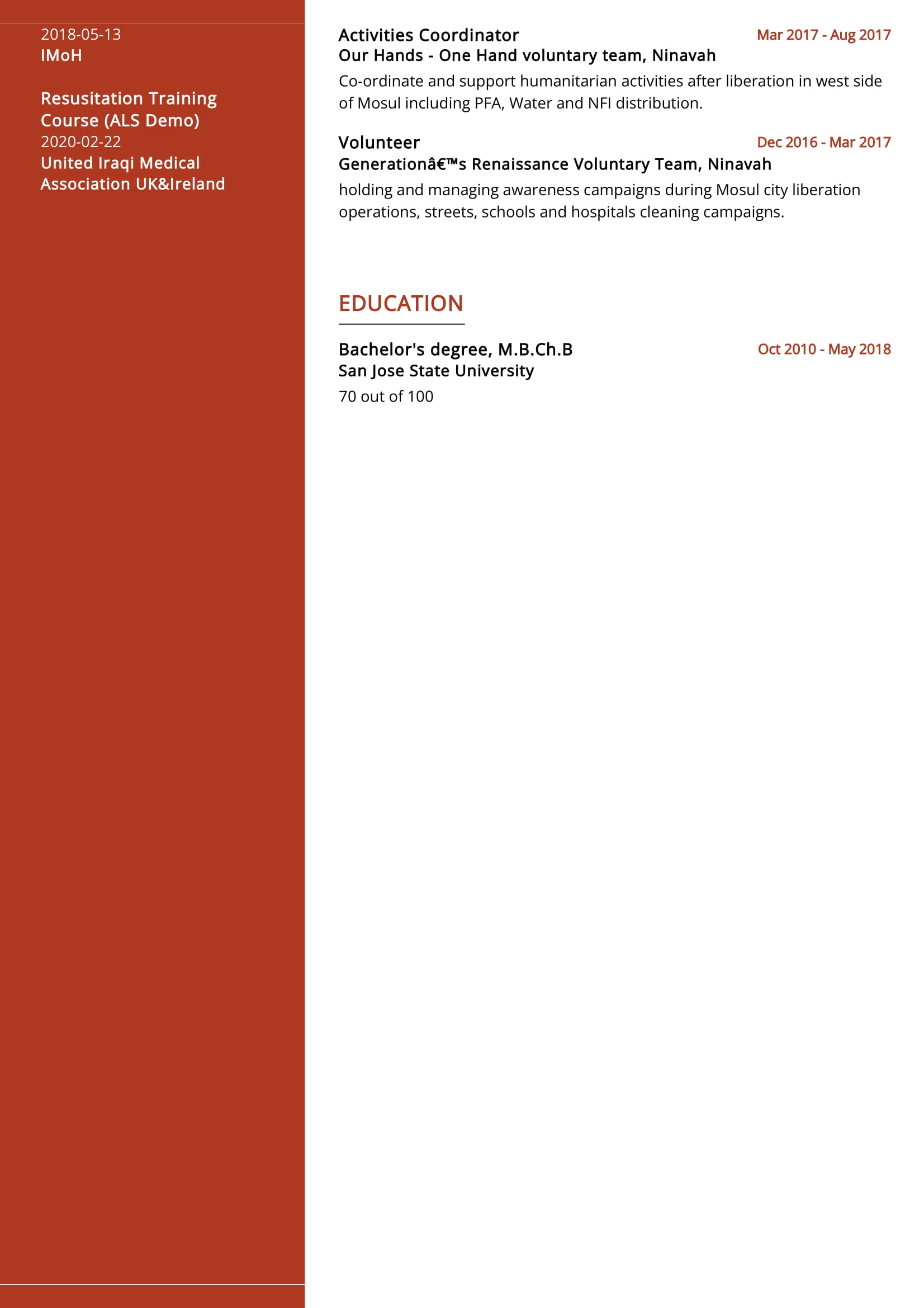What Should Be Included In A Medical Doctor Resume?
When writing a resume for a medical doctor, there are some key pieces of information that must be included to ensure a successful job search. As one of the most visible professions, a medical doctor requires a resume that stands out. The following are some of the most important items to include when crafting a resume as a medical doctor.
First and foremost a medical doctor resume should include an up-to-date physician profile. This should include all of the relevant education and certifications that you possess. It should also include any additional credentials, such as any professional associations or awards that you may have received.
In addition, you should include your areas of specialty, such as emergency medicine, internal medicine or pediatrics. This will help to ensure your resume stands out and is tailored to the specific job that you are applying for.
Your medical doctor resume should also include your work experience. This should include any volunteer work or internships that you have done as well as paid medical positions. It should detail the start and end dates of each position as well as the duties and responsibilities that you were responsible for in each role.
Finally, your resume should include any other relevant information. This could include any research projects or publications that you have been involved with. Additionally, it should list any professional memberships or other organizations that you have joined and any awards or special recognition that you have received.
By including all of these pieces of information on your medical doctor resume, you are ensuring that your application stands out and that you are representing yourself in the best possible light.
What Skills Should I Put On My Resume For Medical Doctor?
When writing a resume for a medical doctor, the skills you list should reflect your specific qualifications and experience. As a medical doctor, you should emphasize your medical knowledge, clinical skills, medical research and training, and any specialized certifications or licenses. You should also consider highlighting any administrative or management experience that you may have, as many medical doctors are now in leadership positions within their organizations.
When considering what skills to list on your resume, start by thinking about the job you are applying for and the kind of skills and knowledge required. For example, if the job is in an emergency department, you may want to emphasize your knowledge of emergency medicine, whereas if you are applying for a position in a research lab, you may want to focus on your research skills and experience.
Once you have determined the type of skills needed, create a skills section in your resume that information about the key qualifications for the job. This could include highlighting any certifications you have, such as CPR or advanced life support, as well as specific medical knowledge or techniques you are proficient in. Additionally, you should list any leadership or managerial experience you have, such as any clinical or administration roles you have held.
Finally, if you have any specialized expertise, such as in a certain specialty or technology, you should include that as well. This could include mentioning any publications or professional presentations you have given.
In summary, when writing a resume for a medical doctor, be sure to emphasize your medical knowledge, clinical skills, and any specialized expertise or training you have. Also consider highlighting any administrative or management experience you may have, as this could be valuable in a medical doctor position.
What Is The Job Description Of The Medical Doctor?
A Medical Doctor is a highly-trained professional who diagnoses, treats and manages illnesses and diseases. Medical Doctors provide a range of services from preventative care to emergency medical care. Generally, Medical Doctors evaluate patients, diagnose illnesses and conditions, prescribe and administer treatments and medications, counsel patients and families, and monitor the progress of treatment. They also perform surgery and order diagnostic tests, such as X-rays and blood tests. Medical Doctors generally have specialized skills in one or more areas of medicine, such as cardiology, pediatrics, internal medicine, or gynecology.
The job of a Medical Doctor entails much more than just seeing patients and diagnosing illnesses. They need to be able to communicate effectively with patients, families, staff, and other Health Care Providers. They must have excellent problem-solving skills, be able to think critically, and be able to manage their time efficiently. Medical Doctors must stay up to date on the latest developments in medicine and be able to effectively implement new treatments and technologies.
In addition to the medical knowledge and skills required of a Medical Doctor, they must also possess excellent communication and interpersonal skills. They must be able to clearly explain medical conditions and treatments to patients and their families, as well as other members of the Health Care Team. Medical Doctors must also be able to effectively collaborate with other professionals and manage their team. They must be able to work independently as well as in a team setting.
Medical Doctors must also be able to keep accurate records of patient care, have strong organizational skills, and be able to effectively manage their time. Additionally, they must be able to stay up to date on the latest developments in medicine and be able to effectively implement new technology into their practice. They must also have excellent communication skills in order to effectively communicate with patients, staff, and other medical professionals. Lastly, they must be able to work in a fast-paced environment and have the ability to think critically and make decisions quickly.
What Is A Good Objective For A Medical Doctor Resume?
When writing a medical doctor resume, it is important to include a compelling objective statement that will show potential employers why you are the right fit for the job. An objective statement should be a brief, yet impactful sentence that gives the reader an idea of what you can bring to the role and why you are the best candidate for the position.
When crafting your objective statement, it is important to be clear and concise in your language. Make sure to mention any specialized medical experience, certifications, or other qualifications that make you an ideal candidate for the job. Additionally, it is important to note any unique skills or qualities that will make you stand out from the competition. For example, if you have experience working with different cultures or have specialized training in certain areas, this should also be included in your statement.
By taking the time to craft a compelling objective statement, you will be able to make a positive impression on potential employers and set yourself apart from other applicants. In doing so, you will be increasing your chances of being considered for the job and making yourself a standout candidate for the position.
What Are The Career Prospects In The Medical Doctor?
The medical doctor field is an exciting and rewarding career choice, with a variety of career options available. With a medical doctor’s specialized training and experience, they have the potential to work in nearly any healthcare-related field. Medical doctors are in high demand in many countries, and the medical doctor’s salary is extremely competitive.
As a medical doctor, you will have the opportunity to diagnose and treat a variety of illnesses, as well as monitor the health of your patients. In addition, you can work with a variety of specialists, such as surgeons and radiologists, to provide the best possible care for your patients. Furthermore, you will have the opportunity to work with the latest medical equipment and technology to ensure that your patients receive the best possible care.
A medical doctor can choose to specialize in a particular field, such as pediatrics, internal medicine, or cardiology. This can open up a variety of job opportunities for the medical doctor. Furthermore, medical doctors can choose to work in a variety of settings, such as clinics, hospitals, and private practices.
The job outlook for medical doctors continues to be favorable, as the demand for health care professionals continues to grow. With the right qualifications and experience, a medical doctor can have a long and successful career. With the right support and resources, a medical doctor can continue to advance in the medical field and achieve success.
Key Takeaways for an Medical Doctor resume
Writing a medical doctor resume can be a daunting task. With so many qualifications, licenses, and certificates to consider, it’s easy to become overwhelmed. But don’t worry – this guide will help you craft the perfect medical doctor resume. Here are some key takeaways for an effective medical doctor resume:
Make sure that your resume is organized, concise, and easy to read. Highlight your credentials, work experience, and relevant skills. If you have any publications, honors, or awards, include them as well. Use keywords throughout your resume to make sure that search engines can easily find your resume.
Be sure to include a professional summary at the beginning of your resume. This section should provide a brief introduction of who you are, your qualifications, and how you can benefit the employer.
Your education must be thoroughly listed in your resume. Include details such as your degree, university, and graduation date. If you have any specializations or certifications, make sure to include those as well.
Finally, make sure that you include a list of references that are easily accessible. This will show potential employers that you are a credible and trustworthy applicant.
By following these simple steps, you can ensure that your medical doctor resume is well-crafted and effective. With a well-written resume, you’ll be one step closer to your dream job!



